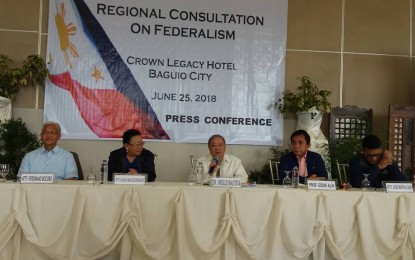
PUBLIC INSIGHT ON FEDERALISM. Five members of the Constitutional Committee (ConCom) tasked to review the 1987 Constitution update journalists in a conference in Baguio on Monday (June 25, 2018) as they start a two-day public consultation on federalism. Facing the media are (from left) Commissioners Ferdinand Bocobo, Susan Ubalde-Ordinario, Dr. Virgilio Bautista, Eddie Alih, and Jose Martin Loon. (Photo by Liza T. Agoot)
BAGUIO CITY — The Consultative Committee (ConCom) reviewing the 1987 Constitution is set to submit the draft Constitution it created to President Rodrigo Duterte on the first week of July, before the Chief Executive delivers his third State of the Nation Address (SONA), members said in a press conference here on Monday.
ConCom members — Dr. Virgilio Bautista, Professor Eddie Alih, and lawyers Susan Ubalde-Ordinario, Jose Martin Loon, and Ferdinand Bocobo — appeared before Baguio-based and national media in a pre-public consultation press conference.
The ConCom is in the city for the Cordillera leg of consultations, the second after Dumaguete City.
Commissioner Bocobo said the draft includes most of the provisions of the 1987 Constitution with minor amendments in some sections, major revision in some, especially provisions that are outdated or no longer applicable, and some new articles.
Bautista said while the consultations with different sectors in the regions are still being conducted, the discussions will still form part of the report that will be submitted to the President.
The President will then submit the same to Congress, which will convene as a Constituent Assembly (ConAss) to finalize the revisions that will be submitted to the people for ratification in a plebiscite.
Bautista said expert resource persons were invited for their insights and inputs during Concom’s four months of regular deliberation on the Constitution.
He said while they were appointed by the President, “there were no instructions relayed nor intervention from the President” on how they will make the draft.
Ordinario, for her part, said "the provisions were carefully fought over by 22 hard-headed members. But in the end, we came up with provisions that answer the the nation’s need, for the greater welfare of the people.”
Among the salient revisions in the provisions that form part of the draft is the qualification of the President, Vice President, and members of the Congress — that they must hold a college degree or its equivalent. The present Constitution only requires that the President “can read and write”.
The draft also proposes that the vote of the President will be a vote for the Vice President.
The Senate will be a representation of all the 18 regional governments that will be created, with each having two representatives to vote for, for equal representation.
There will be a maximum of 400 members of the Congress, with 60 percent to be voted by the existing Congressional districts. The 40 percent will be voted through proportional party representation, including those from the marginalized sectors.
Additional high courts will also be created -- the Federal Constitutional Courts that will tackle Constitutional issues and impeachment; the Federal Administrative Courts that will tackle the decisions of the quasi-judicial bodies; the Federal Electoral Court that will handle all electoral contests. This is meant to unclog the the Supreme Court and speed up the delivery of justice.
An Inter-government Commission will resolve issues between the federal government and the regional governments and among the regional governments.
The commissioners said that up to about 12,000 cases are pending every year with the high court, which explains the delay in their resolution.
The draft also includes a provision on national security that will enable government to respond to cyber attacks.
They added that there will be no diminution of the revenue share of local governments. On the other hand, the regional governments which will be empowered to collect certain taxes such as documentary taxes, sales, licenses, franchise taxes, and fees.
The regional governments can also come up with revenue measures to gain more funds for their operation. However, the regional governments are barred from coming up with taxes that will redound to double taxation.
Solutions to problems and issues would no longer take much time, as the regional government can already address them, the proponents said.
The commissioners were one in saying that the concept of distributing the power and making the regions strong is the primary idea in Federalism. The draft also contains a fiscal protection for the federal government to ensure that its national operation would also be strong.
They also assured that there will be no displacement of state workers, but protection, not only for the regular government employees, also for the temporary workers. (PNA)
